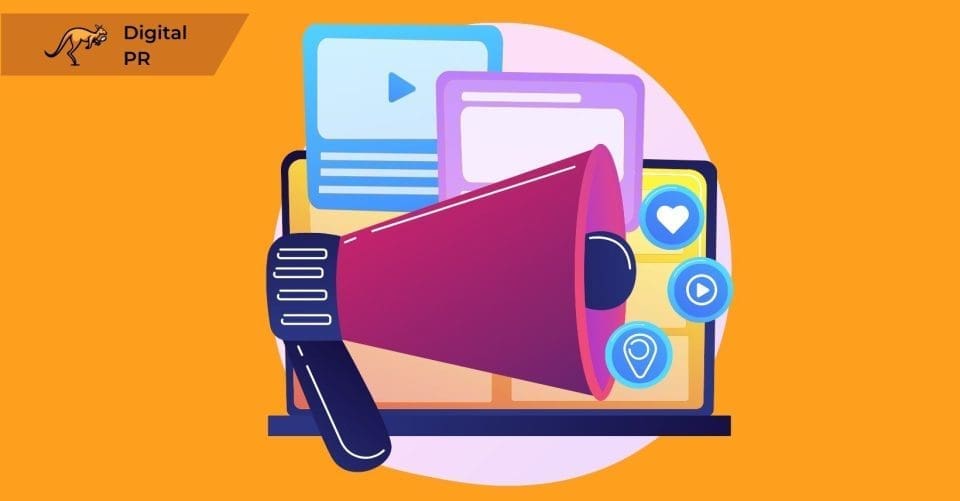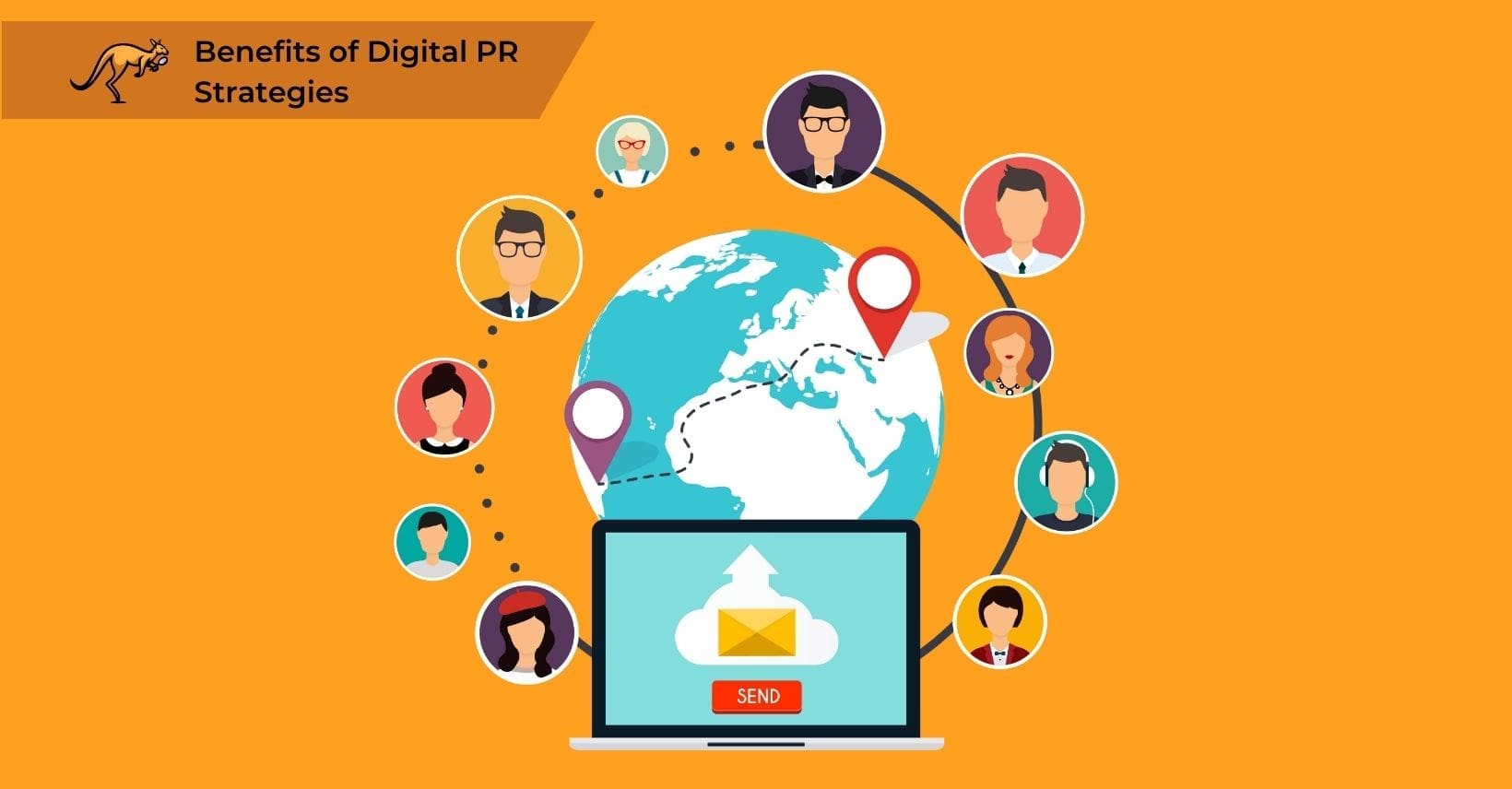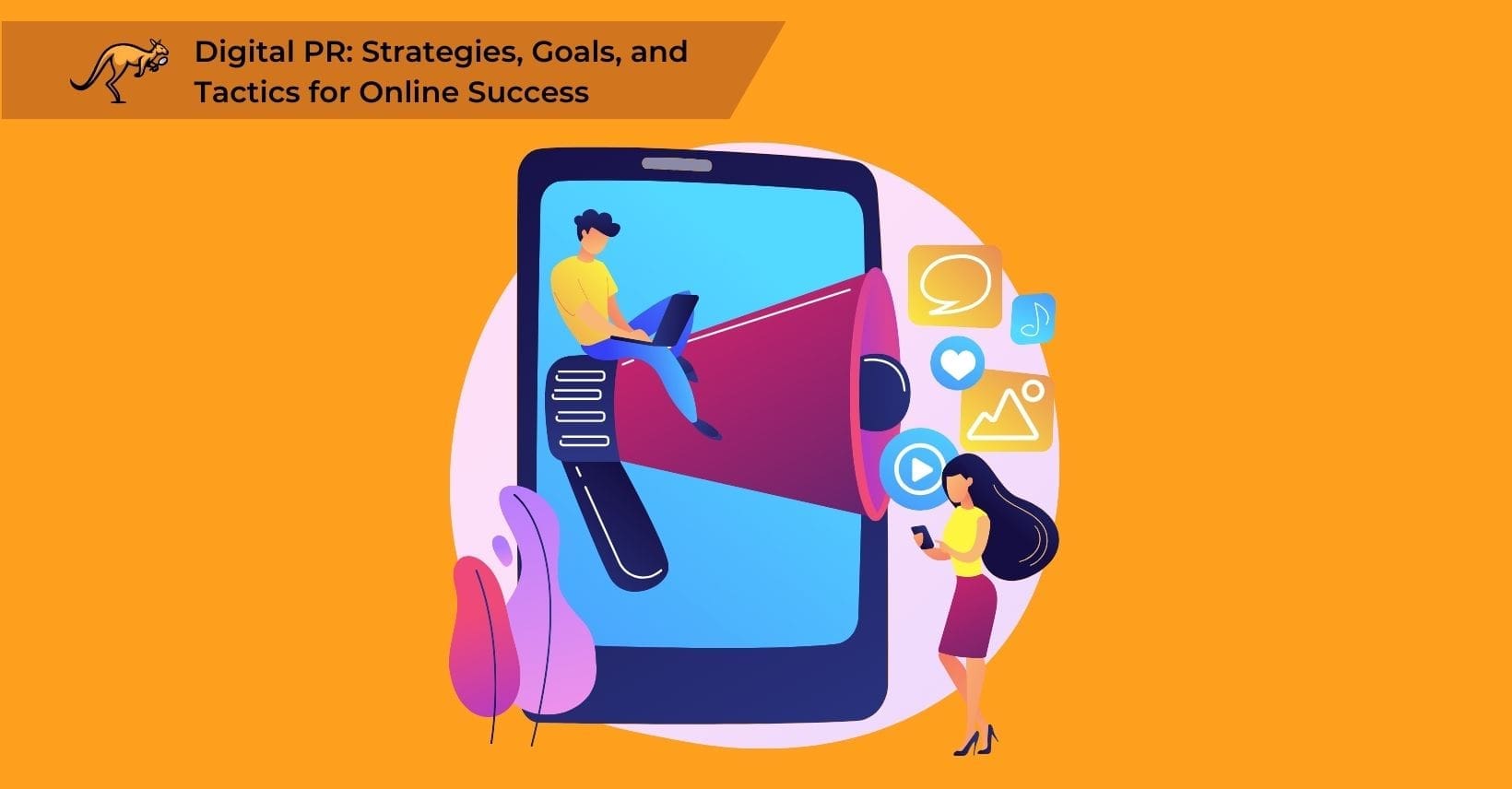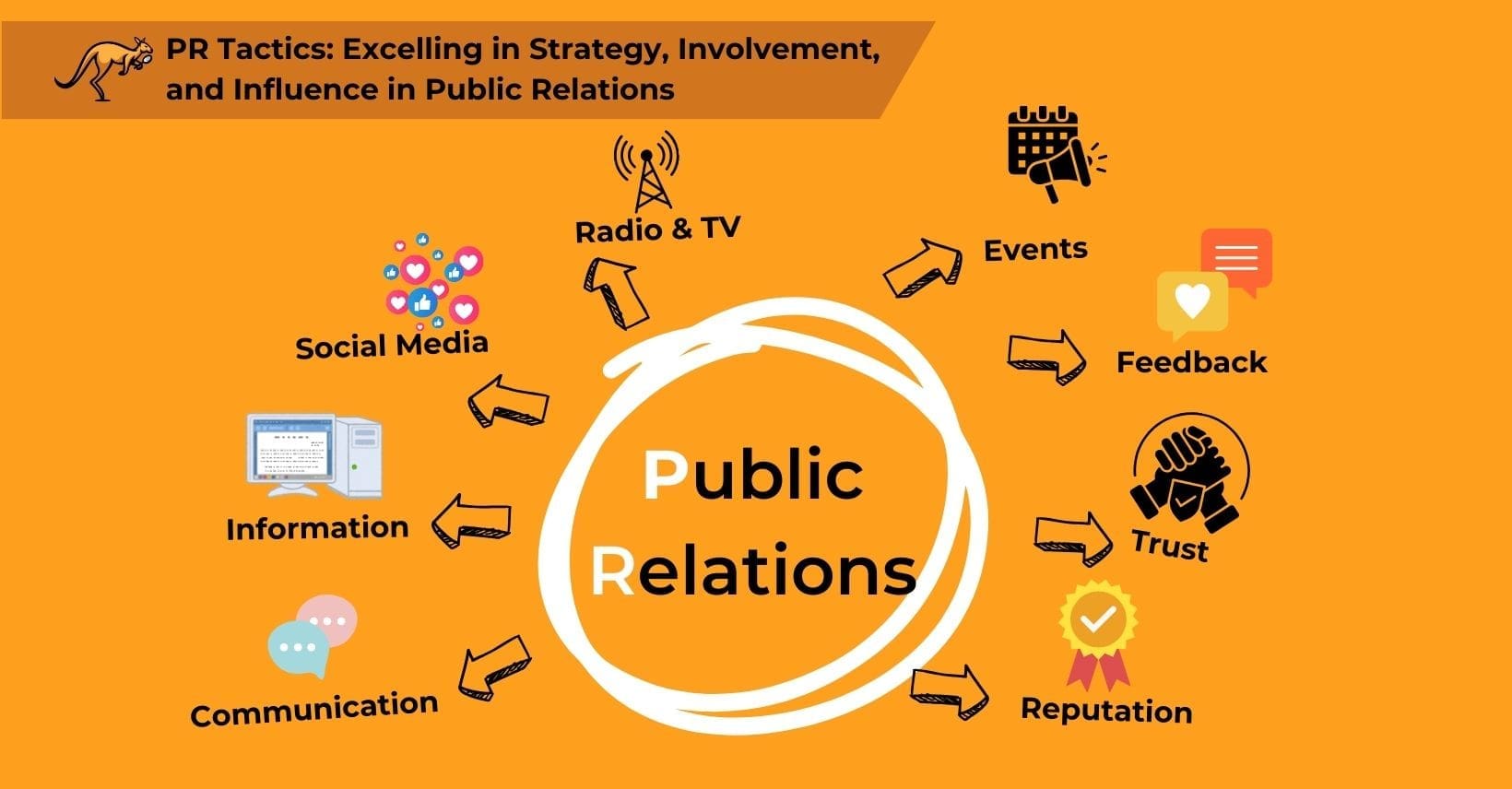Digital PR is how a company ensures its online appearance. It uses blogs, websites, and social media to spread the word.
The main goals are to increase the company’s online visibility, earn backlinks, and strengthen the brand—these are key to a company’s success today.
With more people using the internet, digital PR has become more important.
It helps companies reach many more people through social media, which is a big part of why digital PR is growing along with digital marketing.
As we continue, we’ll see why digital PR is important and how SEO companies help boost it. We’ll also look at some real-life examples.
This brings us to an interesting point: What is Digital PR, and why does it matter? We’re about to explore its role and benefits further.
What Is Digital PR?

Digital PR leverages online platforms such as social media, websites, and emails to effectively manage a company’s public image. It aims to enhance customer awareness of a business’s offerings by maximizing the extensive reach of the Internet.
Digital PR modernizes traditional public relations tactics, employing effective digital tactics such as social media campaigns, influencer partnerships, and data-driven content creation that engage audiences, disseminate information about products or services, and forge new connections.
It is crucial for businesses that strive to surpass their competitors and amplify their brand visibility online. Crafting a digital PR strategy involves selecting and applying specific PR tactics that support a company’s objectives, where tactics like press release distribution, journalist outreach, and social media engagement fit into the broader strategy framework to attract and convert potential customers.
As digital PR continues to redefine how brands interact with their audiences, it’s clear that understanding its impact is key to navigating the complexities of market competition and brand recognition.
Why Does Digital PR Matter?
Brands are competing more fiercely than ever, making it crucial to capture attention and ensure that it is relevant, targeted, and converted to sales.
Digital PR boosts brand recognition and can significantly increase organic traffic, leads, and purchases while promoting social engagement. Regardless of company size, digital PR should be an integral part of any marketing strategy, using paid and organic tactics.
It serves a critical role by exposing a company to potential new customers within its target market through search engine results and features in major online articles.
Digital press releases often get picked up by media outlets, creating new inbound links that improve a company’s online visibility by enhancing its search engine optimization. This connectivity makes it easier for potential customers to discover the company online.
Today’s consumers are well-informed and research-driven when making purchasing decisions, utilizing channels like industry publications, social media, review sites, and independent blogs and forums.
With such a broad approach necessary, it’s important to understand the various objectives that guide digital PR efforts, which include fostering connections and driving growth through strategic communication.
What Are The Goals Of Digital PR?
Digital PR goes beyond merely boosting sales; it integrates the full scope of traditional public relations into the online arena.
The objectives of your digital PR campaign will vary depending on your company’s field. Still, common aims include using press releases to capitalize on current news or employing influencer marketing to reach audiences.
Let’s take a look at some of the most important purposes.
Getting More Brand Coverage
Effective digital PR strategies begin at the inception of a company. When your business is new, create an online presence that clearly communicates your identity, your values, and what you stand for to your target audience.
This not only introduces your brand but also gives you control over how you are perceived.
Achieving a memorable impact often involves gaining media attention during your launch, which can give your marketing efforts a strong initial boost.
Yet, the need for innovative outreach persists even for established companies. Continuous, creative efforts are necessary to maintain brand visibility and keep ahead of competitors.
As these initiatives help you foster recognition, they naturally pave the way for building and strengthening connections that are essential for sustained engagement and long-term success.
Building Relationships
Building long-term relationships with journalists is a key digital PR tactics. When a well-known journalist consistently covers your press releases, it becomes a cornerstone of your PR strategy.
Media coverage puts you in the spotlight directly in front of your target audience. Initially, you will often need to pitch your stories to journalists actively.
Over time, as these relationships with journalists and social media influencers strengthen, you’ll spend less time on pitches and more on creating newsworthy content and generating demand for your products.
Although building these relationships is a gradual process without immediate results, the payoff comes from sustained media coverage. This elevates your brand and boosts organic search traffic significantly when major publications feature your stories.
As you continue to gain media attention and experience these benefits, it’s important to consider how to support these efforts and further enhance your visibility in search engines.
Supporting Your SEO Efforts
Any SEO company will highlight the importance of link building. Digital PR employs specific link building tactics such as creating newsworthy research studies, developing shareable infographics, and crafting expert opinion pieces that generate high-quality backlinks from authoritative news sites.
News site links are typically high-authority, boosting domain rating and SERP visibility. Digital PR tactics that support SEO efforts include strategic guest posting, data-driven content campaigns, and newsworthy story creation, which simplify Google analytics and SERP challenges while streamlining a significant portion of your link-building.
Earned media visibility tends to increase over time. Once your site lands a link on a major news outlet, other outlets follow suit, leading to more links and increasing referral traffic. This tactic remains crucial in both traditional and digital PR realms.
Additionally, when news articles share your content on social media, they also contribute to your social media marketing efforts, subtly enhancing your brand’s overall online presence. Digital PR tactics differ from traditional PR tactics in that digital PR focuses on measurable online metrics, utilizes data-driven content creation, and targets digital publications where traditional PR relies more heavily on print media, in-person events, and broadcast coverage that lack the same tracking capabilities. As these strategies evolve, they pave the way for leveraging digital tools to boost your visibility and influence further.
The Benefits of Digital PR Strategies

Digital PR is essential for any digital marketing plan. If you can’t handle it yourself due to time constraints or lack of expertise, hiring a digital PR agency could be a great choice.
Effective digital PR offers key advantages. It boosts your brand’s visibility and enhances its reputation online. A well-managed digital PR campaign increases your website’s traffic and contributes to your business’s credibility and trustworthiness.
Engaging with high authority sites is another method to elevate your online presence, creating valuable connections that further authenticate your brand in the digital space.
Building Links To High Authority Sites
When authoritative websites link to your site, they pass on some of their authority. This process boosts your website’s authority. Typically, influential niche-specific sites like trade show platforms or key industry publications are the ones that might link to you through things like press releases.
Staying ahead of copycats means continuously attracting valuable links to maintain and enhance your site’s credibility and visibility.
Staying Ahead Of Copycats
Traditional link-building strategies often struggle to replicate the results of digital PR, where each written piece stands alone in its content and impact.
Competitors may also engage in digital PR, but there’s no assurance that the same outlets will feature similar content by the time they act. This uncertainty means that even if competitors produce comparable articles to attract links, they might not find available space or attention from journalists.
Additionally, even a diligent competitor monitoring your backlink profile and attempting to mimic it will find that simply replicating your strategies—such as posting on the same websites—isn’t straightforward.
These challenges pave the way to increase leads, drive more traffic, and ultimately, boost sales through innovative approaches.
More Leads, More Traffic, More Sales
Digital PR effectively showcases your brand to the ideal audience at just the right moments.
By strategically planning your campaigns, you can highlight new products, seasonal deals, or special offers to attract customers who fit your niche while cultivating potential leads.
It’s crucial to understand the role of relevance in this process. Often, people confuse niche relevance with traditional link-building strategies.
However, placing SEO links on sites related to your niche enhances the relevance of your subject, helping Google better understand your website’s focus.
Relevance in digital PR means positioning your business, product, or service directly in front of the people who find it most applicable.
This strategic placement clarifies your market position and sets the stage to gain trust and authority within your niche.
Gain Trust And Authority In Your Niche
Website traffic and sales aren’t the only metrics that matter. Building a trustworthy brand reputation is crucial for those looking to stand out.
When people come across your website via a direct link or search engine, their confidence in your credibility will be paramount.
Brand reputation serves as a key factor, especially when companies are vying for visibility. By issuing press releases, you boost awareness and cement your status as a leading authority in your industry. The digital PR tactics most effective for building brand authority include publishing thought leadership content on respected industry platforms, securing speaking opportunities at virtual events, and obtaining expert commentary placements in trusted publications that position your brand as an authoritative voice in your field.
This approach involves creating compelling content, distributing it across social media, and ensuring it reaches prominent websites.
Unlike short-lived strategies such as one-off viral videos, this method is a deliberate part of a broader content marketing plan.
Taking these steps solidifies your reputation and sets the stage for increasing referral traffic, subtly paving the way for new avenues through which audiences can discover your site.
Gain Referral Traffic
Traditional link building aims to send trust signals to Google from authoritative sites, suggesting that your website is a key player in its field and clarifying your content for search engines.
However, these links often fail to establish authority with your audience and may not provide tangible benefits to users. Digital PR changes the game by directly promoting your business as a trusted authority to potential customers and directing them to relevant and engaging resources.
This method increases your site’s visibility and enhances brand recognition, allowing people to discover your content more easily.
With digital PR, referral traffic is usually from an audience already interested in what you offer, where tactics such as creating shareable resource guides, developing interactive tools, and securing placements on industry-specific platforms generate qualified referral traffic that further connects with your audience and effortlessly leads into the nuances of getting started with digital PR.
Getting Started With Digital PR
Starting a digital marketing PR strategy can be implemented through a step-by-step process that leads to excellent outcomes, where businesses can execute digital PR tactics by first identifying newsworthy angles within their operations, then creating compelling content around these angles, and finally distributing this content to relevant media contacts. Begin by setting clear goals, which act as the subjects.
Then, determine the actions or predicates, such as analyzing or promoting, that will target your defined objectives. The objects in this case are the measurable results you aim to achieve.
Once you’ve laid this groundwork, it’s essential to think about who will be receiving your messages. Knowing the right groups of people to communicate with is a key step in refining your approach.
Identify Your Target Audiences
To begin, identify your target audiences for your digital PR campaign, similar to traditional PR approaches. First, focus on prominent news platforms in your niche by searching for related news stories and noting the most influential websites.
These media sites are one of your primary targets. Your next key audience is the general public. Initially, your goal is to place your links on these media sites.
However, the ultimate aim is for the public to click on these links, as your content is created for potential customers, not just for journalists. Understanding how people look for news can further refine your strategy.
Identify Their News Search Intent
When people show interest in a particular field, the search terms they use to find related news often differ from the ones they use for other topics.
To create content that resonates with this interest, you first need to understand these search terms. Using Google Trends is an effective method to identify popular terms.
By selecting the news tab in Google Trends, you can see the news stories currently appealing to your audience. Creating content that aligns with these trends can help increase your visibility and improve your search engine optimization.
As we explore how to make your content even more compelling, consider the impact of well-crafted headlines and engaging introductions.
Write Compelling Content
Top-notch SEO is useless if people don’t enjoy your content after finding it. Boosting awareness via social media or email is effective. Still, visitors will quickly leave if your website content isn’t engaging and helpful.
SEO is important, but your efforts should also focus on producing content worth noticing. If your offer isn’t newsworthy, the journalists you hope to attract won’t give you or your work a second look.
With an eye on making your work appealing to the press, let’s explore how to establish connections with journalists.
Contact Journalists
Here is the center of your new digital PR strategy. Once you have done something newsworthy, you need to make people aware of that news.
Forget the SEO for a minute and focus on media coverage tactics that work, including writing compelling press releases with newsworthy angles, creating exclusive data studies that journalists seek, and developing timely content that responds to trending topics which appeal to human readers.
Once you have got your press release ready, send it out to the press offices from those publications and sites that you identified all the way back at the beginning of developing this digital PR strategy.
Do not expect many responses, though – news editors and journalists are busy, and your hit rate will probably be quite low until you are well-established as a big name in the field.
Refine And Retry
At the heart of your new digital PR strategy lies the essential step of making your achievements known. After accomplishing something noteworthy, it’s crucial to share this news.
Put aside thoughts of SEO for the moment and focus on creating a press release that captures people’s attention, not just algorithms. This press release should then be distributed to the press offices of media outlets you’ve pinpointed at the start of your strategy.
Keep your expectations in check regarding responses; news editors and journalists may not always reply due to their hectic schedules, especially when your name is still gaining recognition in your sector.
As we refine our approach and give it another try, remember that persistence in sharing your stories can gradually build your reputation
Digital PR: The Key Takeaways
A good digital PR strategy is the perfect partner for expert SEO. Digital PR is a bit flashier, a bit more complex, and a bit more authoritative.
It can take a while to wrap your head around how to approach public relations, but once you have got a strategy in place, you can simply follow the same patterns again and again and watch the results start to roll in.



